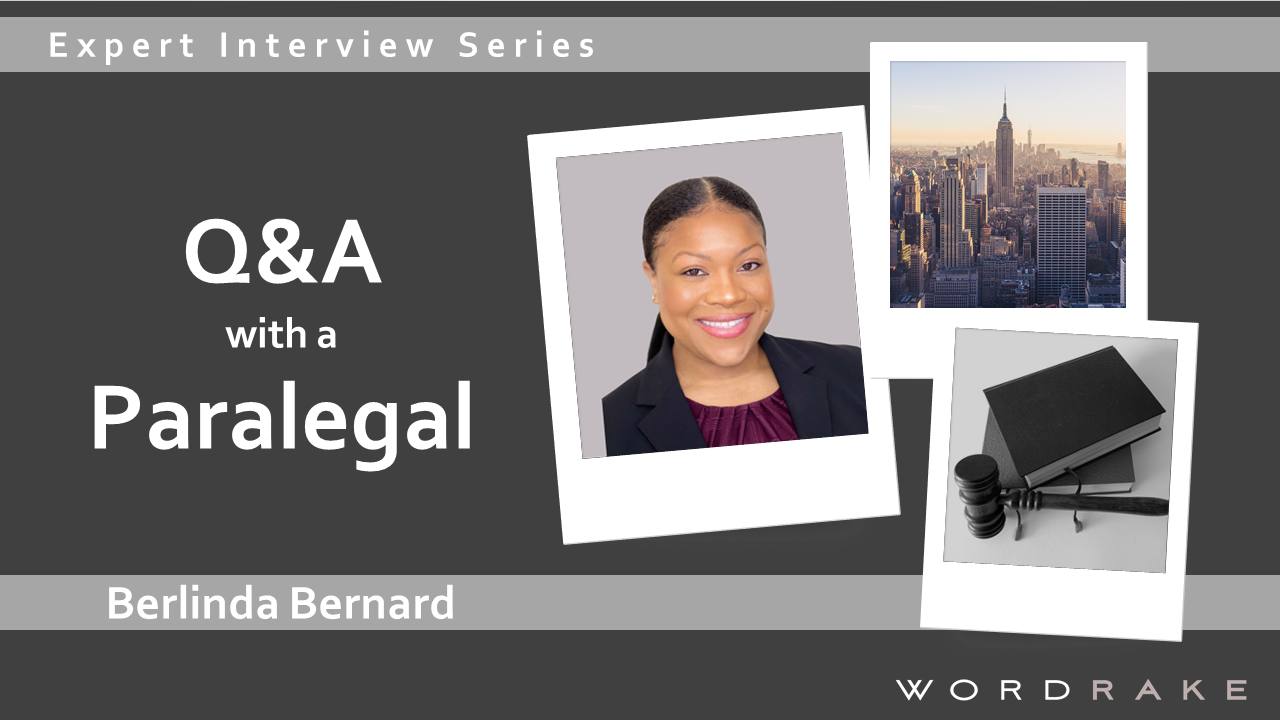Effective communication with clients is required for success as a legal professional. In this enlightening interview, paralegal Berlinda Bernard debunks some myths about paralegals, what paralegals do, and how writing skills are fundamental to her work.
Berlinda Bernard is an experienced paralegal who believes that paralegals should be ready to wear multiple hats. The legal services industry is continuously changing and needs smart legal support professionals with excellent interpersonal, organizational, communication, and technology skills.
What is your role and how did you get to where you are today?
I am an experienced paralegal, and the owner and founder of Quintessential Pillar Paralegal Consulting, LLC. I started my paralegal career in 2009 and have since been using my education, skills, and professional experience to provide quality legal support to lawyers in law firms, corporate in-house departments, and government settings.
I have worked in various areas of law including labor and employment law and bankruptcy law. In these practice areas I offer paralegal services including legal research, legal writing, litigation support, and client intake. I write and share content about the paralegal profession and have published several blog articles which can be found on my company website.
What are the top 3 skills a paralegal must have for success?
The top three skills a paralegal must have to succeed in the field are excellent communication skills (especially written), impeccable organizational skills, and technology skills.
Where can paralegals make the most difference in legal practice?
Paralegals can make the most difference by helping lawyers save time and helping clients save money. They do this by taking on the tasks that a lawyer would be responsible for otherwise. A paralegal can make a difference by mastering these three services: legal research, legal writing, and litigation support. Being tech-savvy on top of all that is a bonus!
What are your thoughts on using technology to help you in your paralegal practice?
I believe it is safe to call myself a legal tech enthusiast! Since starting my paralegal career in 2009, I’ve been a fan of technology. When a new application is introduced, I’ve always been one to welcome it because new technology helps us be more productive and efficient.
What are the 3 most important technology skills that paralegals must have?
A paralegal must be tech-savvy. Lawyers rely upon them to take on the more technical work. They must know how to use law practice management software, legal research platforms, MS Office, and Adobe Acrobat. They also need to know how to use e-Discovery platforms.
Do paralegals have a duty of technology competence?
Paralegals have a duty of technology competence, and every job description requires paralegals to be proficient in office technology. They are often relied upon to handle more of the technical stuff. In my roles, and even in my own business, it is expected that I can use a variety of technology and even train lawyers on how to use them. I have been asked to write manuals and update standard operating procedures for uniformity.
What are the 3 biggest misconceptions that people have about paralegals?
First, the general public believes paralegals can give legal advice. I know this because I am constantly clarifying my role in the legal field and telling folks I can’t advise them. They need to retain a licensed lawyer.
Second, lawyers often confuse paralegals with legal assistants and secretaries. Paralegals are expected to do more substantive legal work––work that can be billed to the client, which the lawyer would be responsible for otherwise. Legal assistants and secretaries do more administrative tasks, usually not billable to the client. This has triggered several blog topics because I’ve realized that I must help lawyers work smarter with paralegals by educating them about a paralegal’s qualifications and reminding them how to use paralegals as a resource.
Third, people think being a paralegal is a “stepping stone” to becoming a lawyer. I have to clarify that they are two disciplines, and the paralegal must go to law school and then pass the bar exam before they can practice law. Experience as a paralegal is helpful, but to be a lawyer, you must go to law school and pass the bar. Only a few states have something akin to the apprenticeship model.
What should a new lawyer know about working with paralegals?
A new layer should build trust and form a partnership with the paralegal. The paralegal will be the best resource they can have. This partnership should start as soon as the paralegal joins the firm or law department or as soon as the new lawyer arrives on board.
What do you wish senior lawyers understood about working with paralegals?
Senior lawyers should give paralegals more credit. Give promotions and pay them fairly according to their actual effort and contribution to the practice.
What do you wish lawyers understood about delegation?
I wish lawyers would make it a priority to build trust with the paralegals from the start. Learn about a paralegal’s background and skillset so they know how to best align them with the work that will come up periodically.
What is your role in the legal drafting process and in working with lawyers to create a better work product?
My role is to create first drafts, fill in all the blanks, and make sure the format is correct. Once all the appropriate information has been incorporated into the draft, I prepare it to be reviewed by the lawyers. I will likely get a redlined copy for review and edits. If there are no other legal staff on the team, such as a legal assistant, I will edit further, finalize for signature, file, and serve.
What document creation tasks are most efficiently and effectively done by paralegals?
Paralegals can do almost anything. In my business, I offer legal writing which covers anything from drafts of demand letters to more complex motions and setting up briefs. This saves the lawyers significant time and saves clients money.
How did you first learn to write well?
I first learned to write well when I was completing my degree in paralegal studies. I enjoyed my legal research and legal writing class so much. I fell in love with the style of writing in the legal setting.
When I started my first paralegal job at a mid-sized law firm, I wrote for work, which took things up another notch. Drafting various correspondences, including demand letters, various pleadings, and preparing supporting documents, confirmed the importance of learning to write well.
I was fortunate to work for lawyers who did not mind editing my drafts and making notes on the margin. I spent significant time working closely with one partner at the firm; he would take time out of his busy day to edit and provide constructive feedback to help me do better on the subsequent drafts. He was even thoughtful enough to give me a copy of Plain English for Lawyers by Richard C. Wydick, considering it essential for the paralegal to learn how to write like the lawyers.
How has writing well helped in your business?
Writing well has helped me tremendously. In legal contexts, certain communication must be written to be taken seriously. As a professional, we must write well when we submit a job application with a resume and cover letter. Throughout the whole process, you must articulate your thoughts in written form.
I personally prefer written communication because I have the chance to be detailed and get straight to the point.
I started my blog last year because I genuinely enjoy writing. Knowing that my audience is used to seeing well-written documents, I edit and proofread to make sure that what I am putting out into the world reflects me as a professional. Since my transition to working as a freelance paralegal and business owner, writing well is even more important. Publishing blogs helps to showcase my professional abilities, because part of my service offering to lawyers is legal writing.
What are 3 tips you have for legal professionals who struggle with their writing?
Tips I have for legal professionals who struggle with their writing are:
- Read high-quality content. ABA articles, briefs, memoranda, and anything you might find in courts, especially filed with the higher courts.
- Start writing. Ask to complete the first drafts. Get involved with the work the lawyers are producing. Practice. Read especially the redlined copies so you can follow the writing process. Read the comments in the draft to follow the communication between the writers of those legal documents.
- Take a writing course. My first employer was very generous and mindful of their paralegals. They sent us to a full-day writing class to help us write better. I still remember this because it shows they took writing seriously and suggested that we should, too. There is a paralegal in my network who teaches legal writing, and it is worth it for paralegals to check it out.
- Invest in editing software. It helps you pick up on things you would not have otherwise.
How would you like to see the role of paralegals change in the next 10 years?
In the next ten years, I would like to see paralegals get more recognition and respect for their contribution to the legal industry. Paralegals can do anything, except practice law. They are the quintessential pillar in the legal industry; they should be recognized as such and paid their worth.
What accomplishment are you most proud of in your role?
I am most proud of starting my own paralegal consulting company because of 12 years of varied paralegal experience. I believe I succeeded in every role I’ve held, and it gave me the confidence to offer my services to solo practitioners and small firms looking to work smarter while saving time and clients’ money.
About Berlinda Bernard
Berlinda Bernard is an experienced paralegal, and the owner and founder of Quintessential Pillar Paralegal Consulting, LLC. Before starting her own business as a freelance paralegal and consultant, she spent 12 years using her education, skills, and professional experience to provide quality legal support to lawyers in law firms, corporate in-house departments, and government settings. She has worked in various areas of law, including labor and employment law and bankruptcy law. Berlinda is also a co-author and has published several blog articles which can be found on her company website. Berlinda is a member of several paralegal associations, where she continues to share her knowledge and insights.
About the Paralegal Interview Series
This interview is part of a collection of interviews about paralegal work. By producing this series, we hope to shine a light on some of the most important but often undervalued people in law: paralegals. Paralegals are key contributors to a high-value legal practice and are more effective when they’re empowered. Let’s start working better together.
Nearly everyone working in a law firm writes, and that writing must be done well. WordRake can help produce better, clearer documents in less time. WordRake is clear and concise editing software designed for people who work with confidential information. The software improves writing by simplifying and clarifying text, cutting legalese, and recommending plain English replacements. WordRake runs in Microsoft Word and Outlook, and its suggestions appear in the familiar track-changes style. Learn more about our paralegal program and our 2-week enterprise pilot. Or try an individual license of WordRake for free for 7 days.







